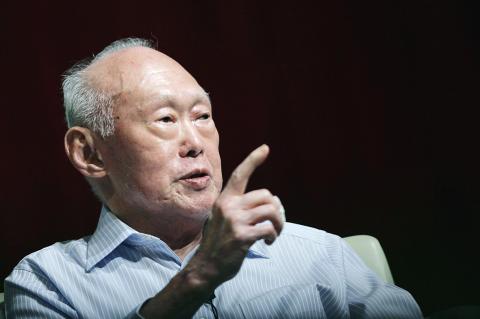Singapore’s founding father Lee Kuan Yew (李光耀) made waves last week when he told a conference in Singapore that he believed Taiwan has been independent “from 1989 to the present.”
Addressing the closing dinner of the two-day Singapore Global Dialogue on Thursday evening, the 88-year-old, who stepped down from government earlier this year after a poor showing by his People’s Action Party in general elections in May, did not elaborate on why he had chosen 1989 as the year Taiwan became “independent.”
Some Taiwanese media have speculated that the former Singaporean prime minister may have regarded the ascension of former president Lee Teng-hui (李登輝) to the Presidential Office the previous year as a turning point.

Photo: Reuters
Despite that view, Lee Kuan Yew said that Taiwan’s “independence” would be unable to resist China, as he did not “see Taiwan being able to resist the pull of the mainland [China], with or without American help,” Singapore’s Chinese-language newspaper Lianhe Zaobao reported.
No amount of security guarantees by the US or arms sales to Taiwan could counter the great pull of China, he said, because unification remains “an unshakeable goal” for the leadership in Beijing.
“[There will] come a time when [even] the Seventh Fleet cannot intervene because of Chinese aircraft carriers,” he said, referring to the refurbished Soviet-era Varyag, which held its first sea trial last month and is expected to be officially launched sometime next year.
China also has plans to build its own nuclear-powered aircraft carriers, which analysts say could be launched by 2020.
“China has always considered Taiwan as a part of China and it wants China to be reunified [sic],” he said. “The fact that Taiwan was independent from 1989 to the present does not make any difference.”
Asked for comment, the Chinese Nationalist Party (KMT) and the Democratic Progressive Party (DPP) would not speculate on the reasons behind Lee’s assertion that Taiwan is independent, choosing to focus on arms sales instead.
DPP spokesperson Liang Wen-jie (梁文傑) said that Taiwan had been able to sustain the “status quo” since 1949 because the nation maintained certain defensive capabilities.
If China attempted to take over Taiwan by force, Liang said, it would pay a huge price.
Liang added that if Taiwan, much like Hong Kong or Macau, did not have certain defensive capabilities, it would have been impossible to maintain its independent sovereignty and democratic system for 60 years.
Meanwhile, KMT spokesperson Lai Su-ju (賴素如) said that US arms sales to Taiwan would not affect cross-strait relations and that President Ma Ying-jeou’s (馬英九) administration’s cross-strait policies of maintaining the “status quo” across the Taiwan Strait under the so-called “1992 consensus” remained unchanged.
Ma has made it clear that the government will continue the “three noes” policy of no independence, no unification and no use of force in handling cross-strait relations.
Additional reporting by Mo Yan-chih and Rich Chang

The manufacture of the remaining 28 M1A2T Abrams tanks Taiwan purchased from the US has recently been completed, and they are expected to be delivered within the next one to two months, a source said yesterday. The Ministry of National Defense is arranging cargo ships to transport the tanks to Taiwan as soon as possible, said the source, who is familiar with the matter. The estimated arrival time ranges from late this month to early next month, the source said. The 28 Abrams tanks make up the third and final batch of a total of 108 tanks, valued at about NT$40.5 billion

A group from the Taiwanese Designers in Australia association yesterday represented Taiwan at the Midsumma Pride March in Melbourne. The march, held in the St. Kilda suburb, is the city’s largest LGBTQIA+ parade and the flagship event of the annual Midsumma Festival. It attracted more than 45,000 spectators who supported the 400 groups and 10,000 marchers that participated this year, the association said. Taiwanese Designers said they organized a team to march for Taiwan this year, joining politicians, government agencies, professionals and community organizations in showing support for LGBTQIA+ people and diverse communities. As the first country in Asia to legalize same-sex

MOTIVES QUESTIONED The PLA considers Xi’s policies toward Taiwan to be driven by personal considerations rather than military assessment, the Epoch Times reports Chinese President Xi Jinping’s (習近平) latest purge of the Chinese People’s Liberation Army (PLA) leadership might have been prompted by the military’s opposition to plans of invading Taiwan, the Epoch Times said. The Chinese military opposes waging war against Taiwan by a large consensus, putting it at odds with Xi’s vision, the Falun Gong-affiliated daily said in a report on Thursday, citing anonymous sources with insight into the PLA’s inner workings. The opposition is not the opinion of a few generals, but a widely shared view among the PLA cadre, the Epoch Times cited them as saying. “Chinese forces know full well that

Travel agencies in Taiwan are working to secure alternative flights for travelers bound for New Zealand for the Lunar New Year holiday, as Air New Zealand workers are set to strike next week. The airline said that it has confirmed that the planned industrial action by its international wide-body cabin crew would go ahead on Thursday and Friday next week. While the Auckland-based carrier pledged to take reasonable measures to mitigate the impact of the workers’ strike, an Air New Zealand flight arriving at Taipei from Auckland on Thursday and another flight departing from Taipei for Auckland on Saturday would have to